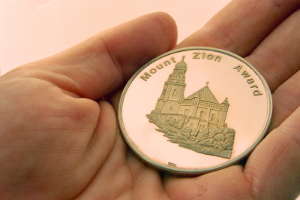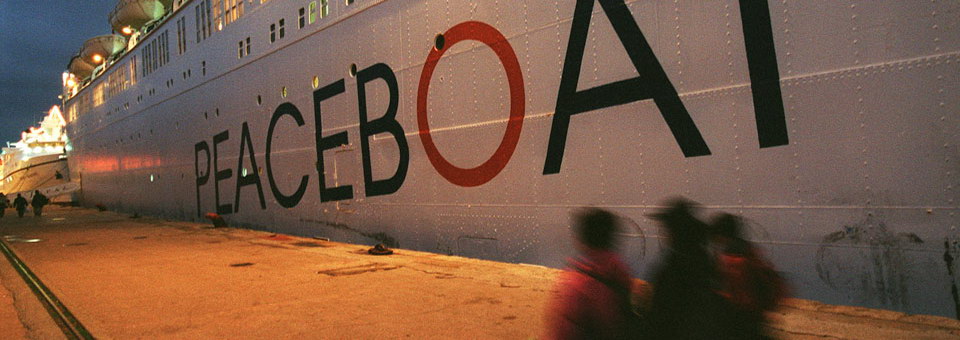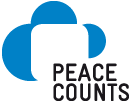Israel: Between Front Lines
 by Michael Gleich
by Michael Gleich
Photos: Frieder Blickle
The Benedictine Abbey of Hagia Maria Sion stands on the line dividing East from West Jerusalem. It is home to the prayers and labors of the Middle East’s smallest peace movement.
By Michael Gleich
Brother Thomas lets a few rather worldly curses fly up to heaven. Yet another checkpoint! He hits the brakes in front of an intimidating ensemble of razor wire and machine gun emplacements. Israeli soldiers with bulletproof vests and inscrutable faces surround the car. They show respect neither for his age nor for his black monk’s habit. No “Please,” just “Passport!” Their treatment of the vehicle’s two Palestinian occupants is even more brusque. “You can’t go through. Or do you have a special permit?” Daoud asks why this stretch of road requires a permit. “Because it’s our land,” says the soldier. “This land is still mine.” All are allowed to pass only after Brother Thomas briefly violates the eighth commandment by naming a goal that arouses no suspicions.
The fourth man in the car, Abbot Benedikt Lindemann, stays calm. He beams at the Israeli soldiers: “Shalom!” His fellow passengers have trouble understanding his friendliness. A 19-year-old with an automatic weapon has declared Palestine to be his personal property, but the abbot just smiles. He promotes a psychotherapeutic view of the situation: “Can’t you feel the stress he’s under, his insecurity? He’s just pitiful.” Israel, the hysterical society? One thing is certain: The whole country is constantly on edge. Paranoia on one side, and on the other, the illusion that a gigantic military machine can force security. Fences, checkpoints, barriers, concrete walls – borderline experiences are part of everyday life.
“Seek peace and pursue it,” Saint Benedict wrote in his rules for monastic life. In Israel, his followers seek and pursue peace under somewhat disadvantageous circumstances. Hagia Maria Sion Abbey, where Abbot Benedikt and his 16 monks devote their lives to the glory of God, is nestled under the Jerusalem city walls. Here, on the dividing line, Palestine and Israel grate against each other like tectonic plates. When the tension is released, the earth shakes.
A clash of civilizations – and in between, the Benedictines. They wish only to work and pray. For 100 years they have been residents of Mount Zion. How do you find inner peace when outside suicide bombers and army bulldozers are spreading anxiety and fear? How is devout contemplation in times of escalation supposed to work?
“Now is exactly the right time,” says the abbot. “Being a monk was always countercultural – celibacy, running to church six times a day, weird outfits. It’s times of crisis that make a life of prayer a truly meaningful alternative.” When the monks elected Benedikt Lindemann abbot seven years ago, he was only 37. He must have possessed his magnetism even then. The charismatic presence with which he showers attention on every conversational partner can prove difficult to escape.
Six times daily, the Benedictines meet for choral prayer in the impressive basilica of sand-colored natural stone. The early morning vigil, then Lauds, Mass, Noontime prayer, Vespers and, late at night, Compline: “Prayer is our way of gaining spiritual energy.” The monks don’t leave it at praying. Faithful to their motto “ora et labora” – pray and work! – they get involved in helping find solutions to their neighbors’ bloody conflict. They tend not to worry about politics, focusing instead on those whom politics ought to be helping. Every summer they invite handicapped children to their facility on the Sea of Galilee. In the salty thermal baths, little Israelis and Palestinians can splash together in harmony.
The monks regularly collect foodstuffs, clothing, and medicine and distribute them in the occupied territories to villages that the ceaseless border closings have cut off from normal deliveries. And they support peace activists on both sides, not only with spiritual assent, but also with cash.
Today they are headed for the vineyard of Daoud and George Nassar. It is one of those days that expose every nerve in the country. During the night, Palestinian extremists have staged a bloodbath in Kibbutz Metzer. Women and children died in their sleep. Israeli helicopters have been targeting Gaza City since daybreak. Not a good day for two Palestinians to ride from Jerusalem to Bethlehem. Today, the short distance takes hours.
Finally the two Nassar brothers and their companions reach their goal. Before them lies their land: forty hectares of vineyards, fig, almond, and olive trees. With the Benedictines’ help, a camp will be erected here for German and Austrian youth to meet with young Palestinians and get to know the conditions under which they live. Shade and water are abundant. The first dormitories are already under construction. One day perhaps young Israelis and Palestinians will sit together around the campfire – inshallah (God willing). One thing is clear. For the Nassars, the camp is an act of self-defense. The five surrounding hills are topped with Israeli settlements, cozy fortresses with heavily armed occupants. The Palestinians fear the illegal settlers’ greed for land. Daoud shows the abbot the traces of their latest attempt to take over the Nassar property. A swath of the heavy earth has been graded flat. “It’s always the same method. If nobody protests the road, suddenly it’s lined on both sides with trailers, a water tower, a high fence, and you can kiss your land goodbye.” How can the Benedictines prevent a hostile takeover of the Nassar vineyard? The abbot says, “Praying doesn’t help. You need a good lawyer.” The abbey pays the bills.
Where a paved road once led to the property, visitors must now cross earthen mounds and trenches on foot. The settlers tore up the road because they didn’t want cars coming so close to their compounds. Can righteous anger get the upper hand? “Sometimes,” says the abbot, leaning into the winter wind with his cap pulled down. “But in principle I try not to take sides. This conflict is incredibly complex. Empathy, on the other hand, is a simple thing. It always goes out to the victims, and they exist on both sides.”
Nothing but victims and no guilty party But isn’t that the problem – that everyone here sees himself as a victim, and no one as a perpetrator? In any case, says the abbot, there have come to be a great many “traumatized souls.” It’s no secret that he currently sees greater unmet needs on the Palestinian side.
“First they were driven from their villages and cities, and now their dignity is being taken away. Humiliation has become a permanent status.” How can one expect peaceful behavior from a people that “has lost so much and has so little to gain”? Peace, he says, is more than an abstract idea. Only if both sides have realistic prospects of a better life will they abandon violence.
The Al-Nadwa Center in Bethlehem trains Palestinian craftsmen, schools journalists, and advises artists on how to market their works. The abbot contributes advice, contacts, and subsidies. Mitri Raheb, the Lutheran pastor who is the center’s director, points to the growing wave of Palestinian emigration. “Our best minds are only thinking one thing – how can I get out of here fastest? We have to prove that our country can offer them a living and food on the table.” The center has already become the region’s second largest employer. Whoever is earning money isn’t throwing stones – or worse – or at least that’s the hope. In the halting machinery of the peace movement, the Benedictines’ work represents at most a small cog. But their aura of weakness has allowed them some achievements, says Abbot Benedikt. “As the smallest religious community, we arouse no suspicions in the general power struggle. Both sides accept us as a conversational partner.”
The abbey has established a foundation that grants the biannual Mount Zion Award to deserving peace activists on both sides. “Jerusalem is regarded by three world religions as a spiritual center. That makes it a good place to build spiritual bridges,” asserts Abbot Benedikt. He meets regularly with a rabbi and a mullah. The three sit down on the floor and meditate together. Each speaks in his own language with the one God for whom mankind has found so many names. The abbot sees his ecumenical urge as a spiritual answer to the grim situation in the “unholy land.” The self-confidence Abbot Benedikt radiates was hard-fought. Born in Germany’s Sauerland region, he was prepared to settle into a still, small life after his college preparatory diploma – army service, teaching, marriage, an inherited house.
But the biography breaks off in the very first stage. At his first army target practice, he became all too ecstatic. “Bang, a hit, another one, bullseye. Firing off rounds was really fun.” It was only when the exercise was over that it dawned on him that his ultimate target wouldn’t be sheets of paper, but people. “They’re teaching me to kill.”
At his second target practice, Private Lindemann becomes a conscientious objector. To prepare for his hearing, he reads the Bible. “I suspected for the first time that the peace to be found in God is deeper than any earthly peace.” He makes a new start with the Benedictines. His first abbot allows him to study tai chi in Barcelona. He experiments with Indian meditation techniques. For a while, he kills quite a few people – in his dreams. “Those were real massacres, with body parts everywhere.” With guidance, he pursues nine years of dream interpretation. Childhood fears and parental doubts confront him: You’ll never make it! But gradually, Benedikt gained clarity. Now he manages simultaneously to radiate power and sensitivity, to combine wit and dignity. At times he is the others’ servant, bringing out the serving bowls and plates in the refectory. At times, he is their chief, carrying on conversations with the Pope.
Strangely enough, it was in the Jerusalem branch of IKEA that the abbot had a key insight. While purchasing pine shelving, he noticed “how the people move differently inside the store, after they’ve passed through the security check at the entrance. Loose, relaxed. Somehow with more joie de vivre.” It occurred to him that the abbey could also be such a place. Soldiers are not allowed inside. Police and secret service disregard the German monks. The seekers of God are surrounded by thick masonry.
The abbot and the monks developed the idea for an academy that would invite Palestinians and Israelis to an exchange of views within the abbey walls. Conversation as antidote, in an hour of lead when anyone who communicates with the other side is in danger of denunciation as a traitor. A site for the construction of the peace academy stands ready. The search for sponsors is underway.
Currently the abbot is preparing an initial conversation between the 25-year-old Rami, with contacts to Fatah, and Karen, 22, who refused to serve in the Israeli army. The two hope to bring activists from the group “Palestine Vision” together with young Israelis. They are fascinated by the abbey’s strategic location between West and East Jerusalem. “We can enter and exit without being observed,” says Rami. Karen nods. Sometimes even peace activists can think in military terms.
The first meeting is to take place after the end of Ramadan, behind friendly walls, in a safe place with reliable hosts. “In a hundred years, we’ll still be here,” says the abbot.

